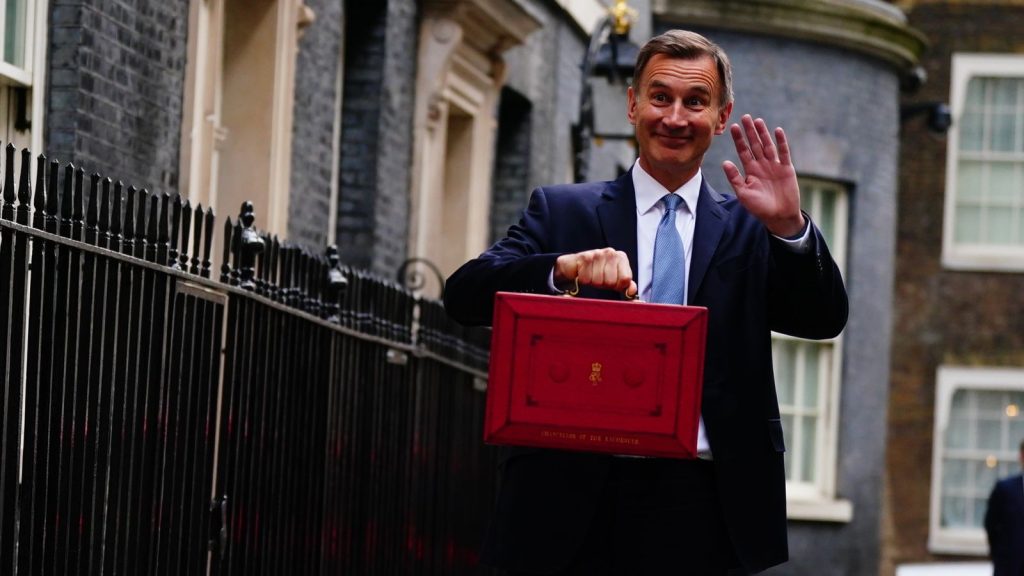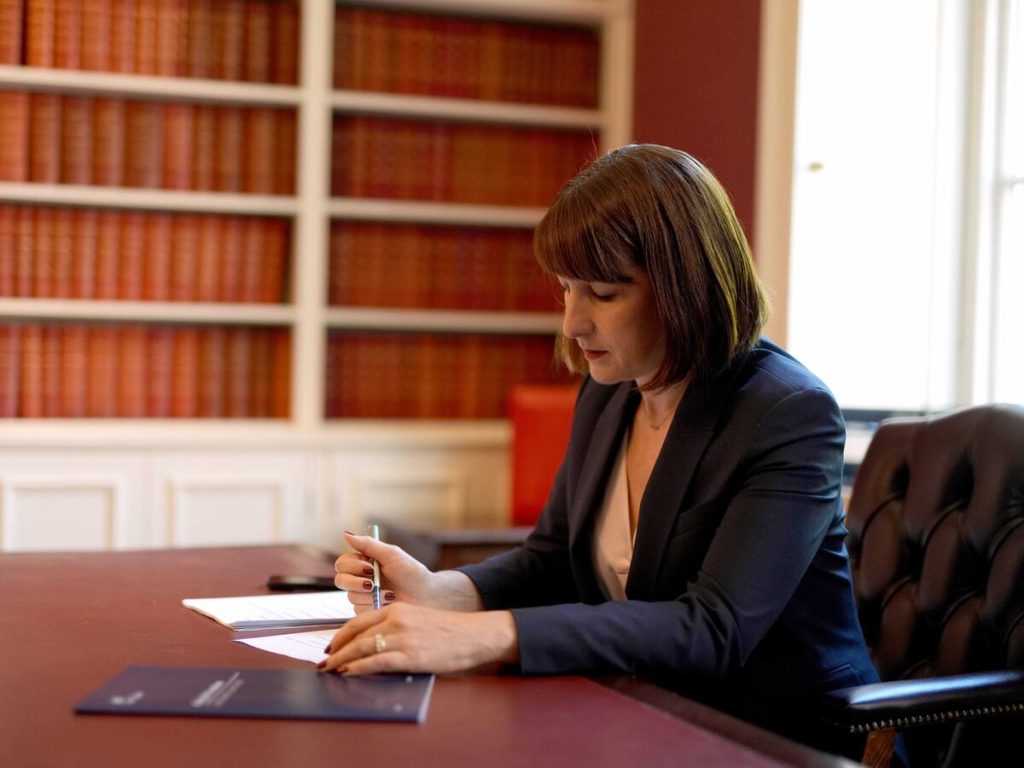THE CHANCELLOR’S announcement that the “black hole” in the UK’s finances was worse than forecast was not surprising.
The Institute for Fiscal Studies and other credible economic forecasters argued forcefully that the position was worse than both major parties were prepared to acknowledge before and during the General Election campaign.
However, the picture revealed on Monday (July 30) suggests the nation’s finances are in a worse state than even the IFS feared.
THE CONSPIRACY OF SILENCE

The IFS’s head, Paul Johnson, repeatedly warned about the “conspiracy of silence” over the hard choices any UK Government of whichever political stripe would face in this and coming years.
For all the difference his warnings made to the messaging of the Conservative and Labour parties, he need not have bothered.
Both main parties argued that economic growth – and virtually nothing else – would solve the nation’s problems. To the outside observer, the only difference between Labour and the Conservatives was how to achieve it.
The reality is—and always has been —that for growth to boost government revenues at the sort of level needed to fill the gap in the UK’s budget, reduce borrowing, and not increase taxes, the British economy would have to grow at an almost unprecedented rate. The rate of growth would have to outstrip anything seen for the last quarter of a century merely to stand still.
Not even the most deranged partisan economist predicted that would or could happen.
COOKING THE BOOKS

The situation has undoubtedly been made worse by what appears to be a longstanding effort to cook the books.
The last government withheld information from the Office of Budget Responsibility, the government’s budget watchdog, and fed it dodgy financial forecasts on public spending commitments.
That is not only Rachel Reeves’s position. A letter sent this week from the OBR to Treasury civil servants seeks an urgent explanation about supposedly politically neutral civil servants treating the OBR like mushrooms: kept in the dark and fed on bullshit.
So much for the long summer holidays; senior Treasury officials must now spend their summers preparing their excuses before the OBR issues a report in October. That report will focus on what they told the OBR to get a passing mark for March’s budget.
Ms Reeves has addressed part of the issue by beefing up the OBR’s powers to scrutinise data. Part of the existing problem is that the OBR does not examine departmental allocations and budget-setting processes. The OBR is superficially a powerful agent within the UK government. However, its real powers are constrained by the quality of the information it receives. Poor data leads to poor predictions.
If the DWP, for example, gets a certain amount of money, the OBR must accept the Department’s word that it will live within its budget.
The scope for systemic abuse is evident and obvious.

And where that systemic abuse is grossest is in the bill for asylum seekers and migration.
According to figures published on Monday, the last government understated the cost of the immigration process by £6.4bn THIS financial year ALONE. It did so by stalling the processing of asylum applications, the decision-making process, and removals and simply not allocating expenditure for processing them.
That was not a financial decision; it was a crude piece of political calculation intended to paint a picture that would show how tough the Conservatives were being on illegal migration. Part of that money, but in context a fraction of the overall total, was for the now-abandoned Rwanda scheme, which would have cost up to three times more than the Conservatives claimed.
The Chancellor also announced the government would not proceed with road schemes, including the £1.3bn project to build a tunnel bypassing Stonehenge, to which the Conservatives had not allocated funding. Boris Johnson’s bold – and totally bogus and unfunded – promise to build 40 new hospitals looks likely to go the same way.
PENSIONERS HIT BY “MEANS-TESTING” DECISION

Although the Chancellor said the “triple lock” on pension increases would remain in place, the headline cut is to the Winter Fuel Allowance.
Rachel Reeves’s decision to target the allowance on those most in need means millions of pensioners will not get £200 towards their winter heating bills.
PensioneRars receiving Pension Credit and other benefits will still receive Winter Fuel Allowance.
Pension Credit tops up a pensioner’s weekly income to £218.15 if they are single or £332.95 if they have a partner.
State and private/occupational pensions count as income, as does – inexplicably – Carers’ Allowance.
The pre-existing system meant that pensioners with significant means and private pensions got the Winter Fuel Allowance, the same as those of very much more modest means.
Those in receipt of the full state pension and nothing else get £221.50 a week. They will not get the Winter Fuel Allowance unless they get another qualifying benefit.
Age Cymru has already condemned Rachel Reeves’s decision.
Chief Executive Victoria Lloyd said: “We know that thousands of households in Wales are failing to claim the £200million that they are entitled to in Pension Credit. So much more needs to be done to support these people in accessing what they are eligible for.
“Means-testing the Winter Fuel Payment in this way gives pensioners little time to prepare and is a decision that could potentially jeopardise their health and finances.
“A decent income provides dignity and security and helps people stay independent and active.
“A warm home, nutritious food, occasional treats and being able to get out and about are all good for health and well-being, helping older people make the most of later life. This should not just be an aspiration but the experience of all older people across Wales.”
However, ahead of the Chancellor’s statement, the Welsh Government announced a scheme to ensure people can access their full entitlement to benefits.
The Single Advice Fund is a free service which provides access to all the advice a person needs to resolve their social welfare problems.
It also makes benefit entitlement checks available to everyone accessing the services.
Last year, the service put over £47.5m back into people’s pockets. 81% said the service found a way forward for them, and 75% said their problem was now resolved as a result.
This funding of £12m per year for three years from April 2025 will fund services that help people manage the cost of living and resolve problems with their housing, welfare benefits and financial commitments.
THE CONSERVATIVES COMPLAIN

Former Chancellor of the Exchequer Jeremy Hunt waded into the Chancellor over her statement’s content.
He claimed: “She will fool absolutely no one with a shameless attempt to lay the ground for tax rises. Those public finances were audited by the OBR just 10 weeks before the election was called.
“We are now expected to believe that in that short period, a £20 billion black hole has magically emerged. But every single day in that period, in fact, since January, in line with constitutional convention, she has had privileged access to the Treasury permanent secretary. She could find out absolutely anything she needed.”
His words would have considerably more force had not the OBR, which “audited” Mr Hunt’s last budget, announced it was investigating why the Treasury had not presented it with the full picture when reviewing its annual spending plans in March.
That’s a significant hostage to fortune for Mr Hunt to offer.
In addition, Mr Hunt pointed out that unemployment was lower than when the Conservatives entered office in 2010, inflation was lower, and the economy was growing.
However, his response missed a key lesson of the General Election campaign. Big economic data—growth, inflation, unemployment—only matter if a government makes voters feel better off. The Conservatives, in power for fourteen years, failed to make them better off or even feel like they were better off.
It was Mr Hunt’s and Mr Sunak’s misfortune to inherit an economic mess left by Liz Truss and Boris Johnson. But they were senior ministers in the latter’s administration.

With tedious predictability, the Welsh Conservative Leader, Andrew RT Davies, accused Rachel Reeves of “rewriting history”.
Exhorting people to never mind the quality, feel the width, Mr Davies said: “While there are many things that I wish the Conservatives had done better, we did leave the UK with the fastest-growing economy in the G7, with low unemployment and halved national insurance for workers.
“Be in no doubt, she’s looking for excuses to unfairly raise your taxes.”
Mr Davies’s reference to the £10bn National Insurance giveaway Jeremy Hunt announced in March is another significant hostage to fortune.
In short, Mr Hunt couldn’t afford to make the cut, which was not covered by increasing tax revenues from mercurial growth forecasts and – as the data now show – was little more than an attempt to bribe the voters. It also only reversed an increase his predecessor as Chancellor – one R. Sunak Esq. – introduced to fund social care and the NHS.
REEVES’S OPTIONS

The decision to carry out a one-year spending review this autumn, followed by a more comprehensive multi-year spending review next spring, strikes a sensible balance. It is also welcome that the Treasury commits to holding a multi-year spending review every two years in the future.
Regular reviews should prevent public service budgets and the demands on those budgets from getting so out of whack – the root cause of many of the in-year overspends revealed by Rachel Reevers. It will also make it harder for governments to game the fiscal rules by pencilling in future spending cuts they have no intention of delivering.
The requirement for the Treasury to share more details of the pressures on departmental budgets with the OBR is sensible, as is the commitment to hold only one major fiscal event a year.
The proof will be in the pudding, but these changes should lead to better and more transparent fiscal policy-making.
Labour committed to not raising NI, income tax, or VAT.
That limits the Chancellor’s room for manoeuvre on tax.
However, the Chancellor brought forward plans to impose VAT on private school fees and shut a potential loophole that would’ve allowed parents and schools to avoid it.
Ms Reeves increased the windfall tax on energy and oil company profits. She reduced the capital allowance, which allowed oil and energy companies to offset their profits against purported capital investments.
When the Chancellor comes to the Budget in October, more tax increases will come into play: inheritance tax, capital gains tax, marginal taxes on investment income, and tightening the rules on non-dom tax status will come into play.
No matter how much any increases in those taxes raise, Labour is boxed in by its promise not to increase taxes on the government’s principal revenue sources.
Income tax, NI and VAT collectively account for about two-thirds of total tax revenue.
Ruling out increases in these biggest taxes doesn’t mean that extra revenue couldn’t be raised by other means. There are other taxes. But it’s a serious constraint.














